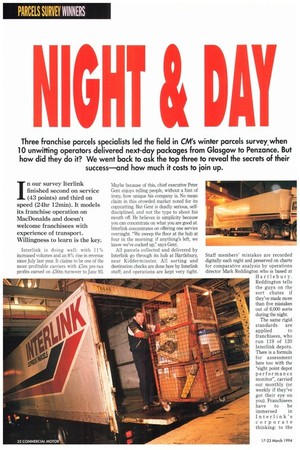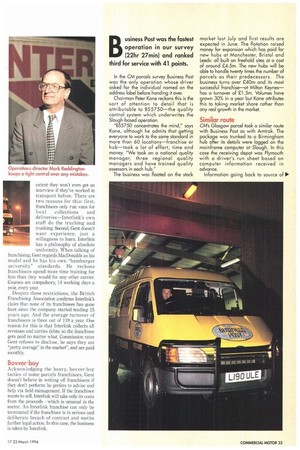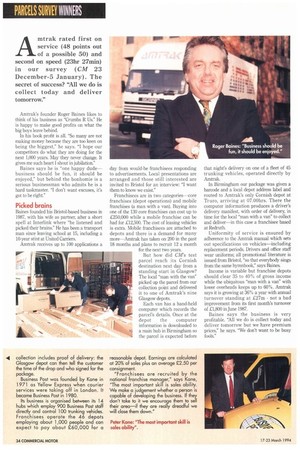Three franchise parcels specialists led the field in CM'S winter
Page 34

Page 35

Page 36

If you've noticed an error in this article please click here to report it so we can fix it.
parcels surveyyhen 10 unwitting operators delivered next-day packages from Glasgow to Penzance. But how did they do it? We went back to ask the top three to reveal the secrets of their success—and how much it costs to loin up.
In our survey Iterlink finished second on service (43 points) and third on speed (24hr 12min). It models its franchise operation on MacDonalds and doesn't welcome franchisees with experience of transport. Willingness to learn is the key.
Interlink is doing well: with 11% increased volumes and an 8% rise in revenue since July last year. It claims to be one of the most profitable carriers with £5m pre-tax profits earned on .£50m turnover to June 93. Maybe because of this, chief executive Peter Gent enjoys telling people, without a hint of irony, how unique his company is. No mean claim in this crowded market noted for its copycatting. But Gent is deadly serious, self disciplined, and not the type to shoot his mouth off, He believes in simplicity because you can concentrate on what you are good at. Interlink concentrates on offering one service overnight. We sweep the floor at the hub at four in the morning: if anything's left, we know we've cocked up," says Gent.
All parcels collected and delivered by Interlink go through its hub at Hartlebury, near Kidderminster. All sorting and destination checks are done here by Interlink staff; and operations are kept very tight. Staff members' mistakes are recorded digitally each night and preserved on charts for comparative analysis by operations director Mark Reddington who is based at Hartlebury. Reddington tells the guys on the sort chutes if they've made more than five mistakes out of 6,000 sorts during the night.
The same rigid standards are applied to franchisees, who run 119 of 120 Interlink depots. There is a formula for assessment here too: with the "eight point depot performance monitor", carried out monthly (or weekly if they've got their eye on you). Franchisees have to be immersed in Interlink's C orporate thinking: to the extent they won't even get an interview if they've worked in transport before. There are two reasons for this: first, franchisees only run vans for local collections and deliveries—Interlink's own staff do the trucking and trunking. Second, Gent doesn't want experience, just a willingness to learn. Interlink has a philosophy of absolute uniformity. When talking of franchising, Gent regards MacDonalds as his model and he has his own "hamburger university" standards. He reckons franchisees spend more time training for him than they would for any other carrier. Courses are compulsory, 14 working days a year, every year.
Despite these restrictions, the British Franchising Association confirms Interlink's claim that none of its franchisees has gone bust since the company started trading 15 years ago. And the average turnover of franchisees is three out of 119 a year. One reason for this is that Interlink collects all revenues and carries debts: so the franchisee gets paid no matter what. Commission rates Gent refuses to disclose, he says they are "pretty average" in the market", and are paid monthly
Bower-boy
Acknowledging the heavy, bovver-boy tactics of some parcels franchisors, Gent doesn't believe in writing off franchisees if they don't perform: he prefers to advise and help via field management. If the franchisee wants to sell, Interlink will take only its costs from the proceeds -which is unusual in the sector. An Interlink franchise can only be terminated if the franchisor is in serious and deliberate breach of contract and merits further legal action. In this case, the business is taken by Interlink, Business Post was the fastest operation in our survey (22hr 27min) and ranked third for service with 41 points.
In the CM parcels survey Business Post was the only operation whose driver asked For the individual named on the address label before handing it over. Chairman Peter Kane reckons this is the sort of attention to detail that is attributable to BS5750—the quality control system which underwrites the Slough-based operation. "B55750 concentrates the mind," says Kane, although he admits that getting everyone to work to the same standard in more than 60 locations—franchise or hub—took a lot of effort, time and money. "We took on a national quality manager, three regional quality managers and have trained quality assessors in each hub."
The business was floated on the stock market last July and first results are expected in June. The flotation raised money for expansion which has paid for new hubs at Manchester, Bristol and Leeds: all built on freehold sites at a cost of around £4.5m. The new hubs will be able to handle twenty times the number of parcels as their predecessors. The business turns over £40m and its most successful franchise—at Milton Keynes— has a turnover of £1.5m. Volumes have grown 30% in a year but Kane attributes this to taking market share rather than any real growth in the market.
Similar route
CM's Glasgow parcel took a similar route with Business Post as with Amtrak. The package was trunked to a Birmingham hub after its details were logged on the mainframe computer at Slough. In this case the receiving depot was Plymouth with a driver's run sheet based on computer information received in advance.
Information going back to source of collection includes proof of delivery: the Glasgow depot can then tell the customer the time of the drop and who signed for the package.
Business Post was founded by Kane in 1 971 as Yellow Express when courier services were taking off in London. It became Business Post in 1 980.
Its business is organised between its 14 hubs which employ 900 Business Post staff directly and control 100 trunking vehicles. Franchisees operate the 46 depots employing about 1,000 people and can expect to pay about £60,000 for a
reasonable depot. Earnings are calculated at 20% of sales plus an average £2.50 per consignment. "Franchisees are recruited by the national franchise manager," says Kane, "The most important skill is sales ability. We make a judgement whether a person is capable of developing the business. If they don't take to it we encourage them to sell their area—if they are really dreadful we will close them down."
Peter Kane: "The most important skill is sales ability".


























































































